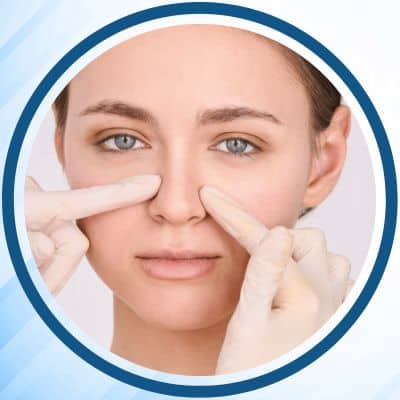Nasal polyps are soft, noncancerous growths that develop in the lining of the nasal passages or sinuses. While they are usually benign, these small, teardrop-shaped growths can cause significant discomfort and affect a person’s quality of life.
What Are Nasal Polyps?
These are painless, grape-like growths that occur in the nasal passages or sinuses. They are typically the result of chronic inflammation and are associated with various respiratory conditions, such as chronic rhinosinusitis (chronic sinus inflammation), asthma and allergies. They vary in size and can occur on one or both sides of the nasal passages.
Causes of Nasal Polyps:
The exact cause is not fully understood, but several factors contribute to their development:
- Chronic Inflammation: Persistent inflammation in the nasal passages or sinuses is a primary cause. This inflammation may be due to allergies, infections or other irritants.
- Asthma: Individuals with asthma are at a higher risk of developing nasal polyps, as there is a strong link between the two conditions.
- Genetics: There may be a genetic predisposition, as they tend to run in families.
- Aspirin Sensitivity: Some people also have aspirin sensitivity, which can worsen their symptoms.
Common Symptoms:
The presence of nasal polyps can lead to a range of symptoms, including:
- Nasal Congestion: Polyps can obstruct the nasal passages, causing difficulty breathing through the nose.
- Runny Nose: Excessive mucus production can result in a persistent runny nose.
- Decreased Sense of Smell: They can diminish the sense of smell, sometimes severely.
- Postnasal Drip: Mucus from the polyps can drip down the throat, leading to a cough or throat clearing.
- Facial Pressure or Pain: They can cause discomfort or pain in the face or around the eyes.
- Snoring and Sleep Apnea: In some cases, they can contribute to snoring and obstructive sleep apnea.
Diagnosis and Treatment:
If you suspect you have nasal polyps or are experiencing related symptoms, consult an ear, nose and throat specialist (otolaryngologist). They will perform a thorough examination, which may include:
- Nasal Endoscopy: A tiny camera is used to view the nasal passages and sinuses.
- Imaging: CT scans can provide detailed images of the nasal passages and sinuses, helping to confirm the diagnosis.
Once diagnosed, treatment options may include:
- Medications:
- Corticosteroids: Nasal corticosteroid sprays can reduce inflammation and shrink polyps.
- Oral Corticosteroids: In severe cases, a short course of oral corticosteroids may be prescribed.
- Antihistamines: These can help manage allergies, reducing inflammation.
- Surgery:
- Endoscopic Sinus Surgery: In cases where medications are ineffective or the polyps are large, surgery may be necessary to remove the polyps and improve airflow.
- Allergy Management:
- Addressing underlying allergies can help prevent recurrence.
- Lifestyle Modifications:
- Nasal irrigation with saline solutions can provide relief.
- Avoiding irritants and allergens can help reduce inflammation.
If you suspect you have nasal polyps or are experiencing related symptoms, contact us at Roanoke Valley ENT and Allergy. Remember, early intervention is key to addressing nasal polyps and preventing complications.
Paul Lenkowski, M.D., Ph.D., is a board certified Otolaryngologist (ENT) and an accomplished head, neck and sinus surgeon. He is passionate about his job and helping his patients. Dr. Lenkowski is dedicated to improving your quality of life and partnering with you to find the best-individualized treatment for your needs. His kind and pleasant demeanor along with his vast experience in the ENT and allergy field will ensure that you and your family receive top-notch care. Dr. Lenkowski earned his B.S. in Chemical Engineering from Rutgers University and went on to receive his M.D. and Ph.D. as part of the Medical Scientist Training Program at the University of Virginia. He completed his Otolaryngology Residency at the University of Iowa.


